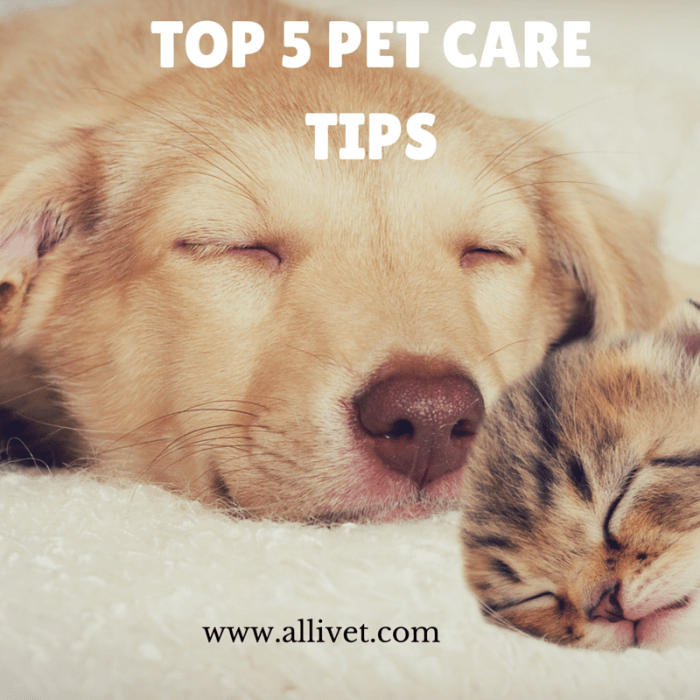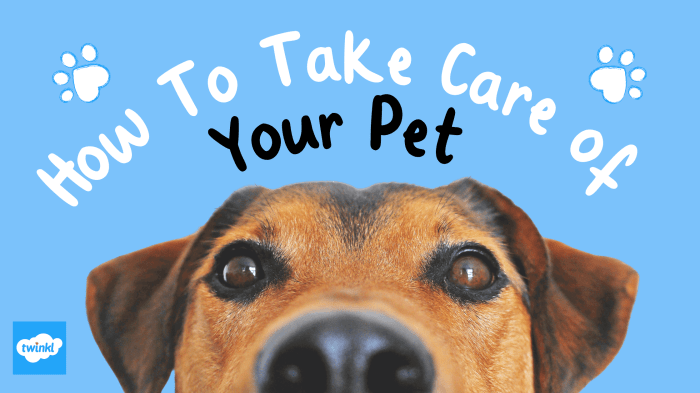Get ready to dive into the world of pet care tips, where we explore everything from nutrition to grooming with a fresh and engaging perspective. It’s time to show your pets some love in the best way possible!
Let’s uncover the essential tasks and practices that will ensure your pets lead a fulfilling and vibrant life by your side.
Importance of Pet Care

Proper pet care is crucial for the overall well-being of our furry friends. It goes beyond just providing food and shelter; it involves taking care of their physical, mental, and emotional needs to ensure they lead happy and healthy lives.
Contribution to Happiness and Longevity
Taking the time to care for our pets by providing them with regular exercise, a balanced diet, and grooming not only keeps them physically fit but also contributes to their mental well-being. Engaging in playtime and training sessions helps strengthen the bond between pets and their owners, leading to increased happiness for both parties. Additionally, regular veterinary check-ups and vaccinations can help detect any health issues early on, leading to a longer and healthier life for our beloved pets.
Impact of Neglecting Pet Care
Neglecting pet care can have serious consequences on the health and behavior of our pets. Lack of proper nutrition can lead to obesity or malnutrition, while inadequate exercise can result in physical and behavioral issues. Neglecting grooming can lead to skin problems and infections, while ignoring regular vet visits can result in undetected illnesses or diseases. Overall, neglecting pet care can significantly impact the quality of life and happiness of our pets.
Basic Pet Care Tips
Proper pet care involves a combination of essential tasks to ensure the well-being of your furry friend. From feeding to grooming, here are some basic pet care tips to keep in mind.
Feeding
- Provide a balanced diet suitable for your pet’s species and breed.
- Ensure access to fresh water at all times.
- Follow feeding guidelines recommended by your veterinarian.
- Avoid feeding human food that may be harmful to pets.
Grooming, Pet care tips
- Regularly brush your pet’s coat to prevent matting and reduce shedding.
- Trim your pet’s nails to prevent overgrowth and discomfort.
- Clean your pet’s ears and teeth to prevent infections and dental issues.
- Bathe your pet as needed to keep their skin and coat healthy.
Exercise
- Engage your pet in daily physical activity to maintain a healthy weight and prevent obesity.
- Provide mental stimulation through interactive toys and games.
- Take your pet for walks or play sessions to promote bonding and overall well-being.
- Consult your veterinarian for exercise recommendations based on your pet’s age and breed.
Regular Veterinary Check-ups
Regular veterinary check-ups are essential for monitoring your pet’s health and detecting any potential issues early on. These visits allow the veterinarian to assess your pet’s overall well-being, administer necessary vaccinations, and provide preventive care to keep them healthy.
Creating a Safe Environment
Creating a safe environment at home is crucial for pet care to prevent accidents and injuries. Ensure your home is pet-proofed by removing toxic plants, securing hazardous items, and providing a comfortable living space for your pet to thrive.
Nutrition for Pets
Proper nutrition is essential for the overall health and well-being of our pets. Just like humans, pets also require a balanced diet to thrive and stay healthy. Providing the right nutrients in the right amounts can help prevent various health issues and ensure a long and happy life for our furry friends.
Different Dietary Requirements for Various Pets
- Dogs: Dogs are omnivores and require a diet that is rich in protein, fats, carbohydrates, vitamins, and minerals. The specific dietary requirements may vary based on the age, breed, size, and activity level of the dog. Consult with your veterinarian to determine the best diet for your dog.
- Cats: Cats are obligate carnivores, meaning they require a diet high in animal protein. They also need specific amino acids like taurine, which is essential for their health. Make sure to choose cat food that meets their nutritional needs.
- Birds: Birds have unique dietary requirements depending on their species. Some birds are seed eaters, while others may require a diet rich in fruits, vegetables, and pellets. Ensure that your bird’s diet is balanced and provides all the necessary nutrients.
- Small Animals: Small animals like rabbits, guinea pigs, and hamsters also need a balanced diet to stay healthy. Their diet should include hay, fresh vegetables, fruits, and a small amount of pellets. Avoid feeding them foods that are toxic to their species.
Tips for Choosing the Right Food and Treats for Your Pet
- Consider your pet’s age and life stage when selecting food. Puppies, kittens, senior pets, and pregnant or nursing animals may have different nutritional requirements.
- Choose high-quality pet food that is made from real ingredients and provides the necessary nutrients for your pet’s health.
- Avoid feeding your pet table scraps or foods that are high in fat, sugar, or salt. These can be harmful to their health and lead to obesity or other health issues.
- Consult with your veterinarian to get recommendations on the best diet for your pet based on their specific needs and health conditions.
Grooming and Hygiene: Pet Care Tips
Regular grooming plays a crucial role in maintaining the overall health and well-being of your furry friend. Not only does it keep them looking their best, but it also helps prevent various health issues that can arise from poor hygiene practices. Grooming sessions also provide an excellent opportunity to bond with your pet and monitor their skin, coat, and overall condition.
Tips on Grooming Different Types of Pets
- Brushing: Regular brushing helps remove loose fur, prevents matting, and stimulates blood circulation. Use a brush or comb specifically designed for your pet’s coat type.
- Bathing: Use a mild pet shampoo and warm water to bathe your pet. Be sure to rinse thoroughly to avoid skin irritation. The frequency of baths depends on your pet’s breed and lifestyle.
- Nail Trimming: Keep your pet’s nails trimmed to prevent overgrowth, which can lead to discomfort and difficulty walking. Use pet nail clippers and be cautious not to cut the quick (blood vessel inside the nail).
Importance of Dental Care
Poor oral hygiene can lead to various dental issues such as plaque buildup, gum disease, and tooth decay. To maintain your pet’s oral health:
- Brush their teeth regularly with a pet-safe toothbrush and toothpaste.
- Provide dental chews or toys to help reduce plaque and tartar buildup.
- Schedule regular dental check-ups with your veterinarian to address any potential dental problems early on.
Exercise and Mental Stimulation
Regular exercise is crucial for maintaining both the physical and mental health of your pets. It helps them burn off excess energy, prevents obesity, and reduces behavioral issues caused by boredom or pent-up energy.
Engaging Activities and Toys
Introducing interactive toys like puzzle feeders or treat-dispensing toys can provide mental stimulation for your pets. Activities such as hide-and-seek games or setting up obstacle courses in your backyard can also keep them engaged and entertained.
Benefits of Interactive Playtime
Interactive playtime not only helps in keeping your pets physically active but also strengthens the bond between you and your furry friend. It encourages socialization, relieves stress, and boosts their overall well-being.
Common Health Issues

Taking care of your pet’s health is crucial to ensure they live a long and happy life. Here are some common health issues in pets and how to prevent and treat them.
Obesity
Obesity is a common health issue in pets, especially in dogs and cats. Symptoms include weight gain, lethargy, and difficulty breathing. To prevent obesity, make sure to provide a balanced diet and regular exercise for your pet.
Dental Problems
Dental problems are often overlooked but can lead to serious health issues in pets. Symptoms include bad breath, yellowing teeth, and difficulty eating. To prevent dental problems, brush your pet’s teeth regularly and provide dental chews or toys.
Fleas and Ticks
Fleas and ticks can cause skin irritation, infections, and even transmit diseases to your pet. To prevent infestations, use flea and tick prevention products recommended by your veterinarian. Check your pet regularly for any signs of fleas or ticks.
Allergies
Pets can develop allergies to various substances like pollen, dust, or certain foods. Symptoms include itching, sneezing, and skin irritation. To manage allergies, identify the trigger and avoid exposure. Your vet may recommend allergy testing or medication.
Ear Infections
Ear infections are common in pets, especially those with floppy ears. Symptoms include ear scratching, head shaking, and odor from the ears. To prevent infections, regularly clean your pet’s ears and check for any signs of redness or discharge.